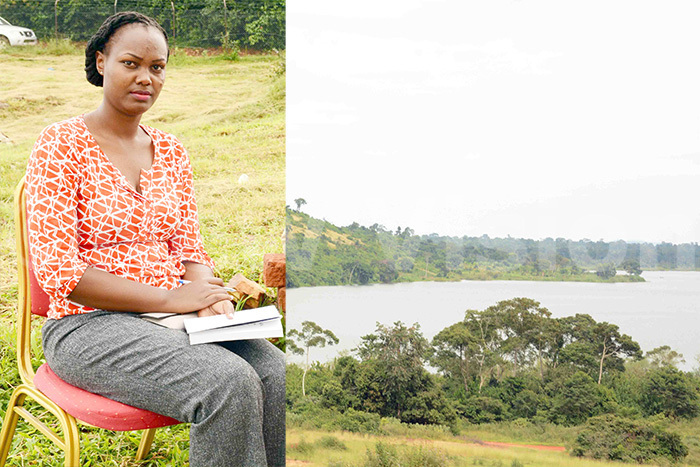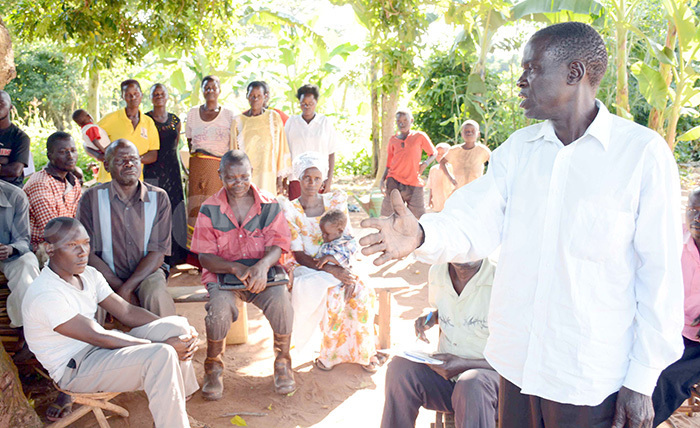Palm oil project would destroy Buvuma Islands: NAPE
The fragile eco systems in Buvuma are rich with biodiversity, but currently threatened by oil palm expansions.
PIC: Men prepare sacks of charcoal for sale from Buvuma Islands. (Credit: Eddie Ssejjoba)
BUVUMA ISLAND THREATENED BY RECLAMATION
National Association of Professional Environmentalists (NAPE), has expressed concern over the fear of environmental destruction in Buvuma for oil palm growing. The Palm Oil project in Buvuma is being implemented by the Vegetable Oil Development Project 2 (VODP) under the Ministry of Agriculture, which also implemented Palm Oil growing in Kalangala district.
The same project, which will be replaced by the National Oil Palm Project (NOPP), targets developing palm oil growing in Mayuge (including Bugiri and Namayengo), Masaka-Kyotera and Mukono-Buikwe districts, as well as establish other palm oil trials in other parts of the country.
The NAPE legal and advocacy officer, Joan Akiiza, said the environment in Buvuma specifically forests, forest reserves, buffer zones, animal and plant species would be threatened.
NAPE's other concerns include setting up nursery beds in wetlands including one at Mukasansa, which she said is supposed to act as a buffer to trap chemicals from the Palm oil gardens from entering directly into the Lake which would lead to siltation of the lake.
NAPE, through its project "securing a healthy ecosystem that supports improved community livelihoods", is working on safeguarding the fragile eco systems in Buvuma, which she said is rich with biodiversity, but currently threatened by oil palm expansions.
Through the project, NAPE is using lobby and advocacy to engage various stakeholders such as National Environment Management Authority (NEMA), National Forestry Authority (NFA), Bidco and communities to conserve the forests, forest reserves, protect buffer zones in the area and also improve food security and land tenure among the communities of Buvuma.

Akiiza, the NAPE legal and advocacy officer. Besides her is Lake Victoria. (Credit: Eddie Ssejjoba)
They suggest that the oil palm project should be environment friendly and conserve the forest cover in Buvuma Islands.
"We do not wish the oil palm project to become a threat to the ecosystem as has been the case in Kalangala where hectares of forests were destroyed after various buffer zones were encroached on. We also desire that the project adheres to the principles of free prior informed consent, respect of human and environmental rights," she said.
Other concerns include uncontrolled cutting down of trees from the forest reserves for the booming charcoal business from the Islands for sale in Lugazi, Mukono and Kampala, which has become one of the major daily activities but threatening forest cover.
Akiiza stated that NAPE also learnt that in addition, community rights with regard to land ownership are being violated giving examples of four villages in Buwooya Sub County where the valuation criteria was not consistent.
One of the residents complained that some of their colleagues accepted to be compensated the little money that was offered and left while those who opted to stay were being intimidated by some project officials to give up their bibanja.
Local Council leaders in Buwoya stated that residents' desire not to sell land for oil palm growing should be respected so that they remain with their land and grow food for their families. They stated that government should respect their rights as opposed to intimidating them to sale the land as has been the case.
Akiiza stated that residents who were compensated, but failed to purchase land elsewhere would be forced to settle in forest reserves as the only alternative since they will not have land to grow food, thereby threatening the biodiversity in the area.
She said already several people have started settling in Nandala and Buluku Forest reserves.

The project co-ordinator, Connie Masaba, however, earlier said the ministry was seeking Parliament's authorisation to borrow $75.82m from the International Fund for Agriculture (IFAD) to support the National Oil Palm Project.
She admitted that they still face challenges with acquisition of land, adding that the process has been long, difficult and expensive, and had so far acquired 5,000 hectares but were making efforts to secure more 1,500 hectares.
"The delays are due to multiple interests on the land where we have landlords, tenants and licensees, who all have claims on the same land," she explained. She pledged to revisit the compensation exercise to ensure no one was left grumbling.